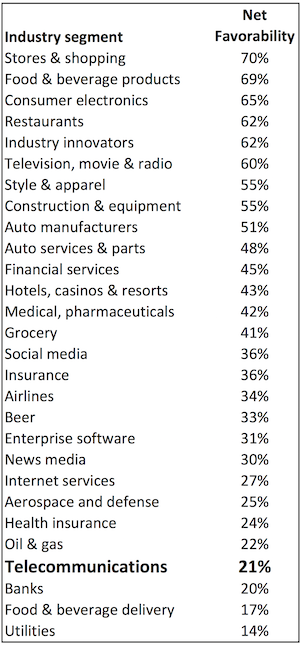People in the U.S. love big shopping, food and consumer electronics brands, but are not high on utility, telecommunications and food delivery companies and banks. That’s one take-away from the spring 2017 edition of the list of “America’s most loved brands” by Morning Consult. What was published was only a partial list – intended to draw you in and sign you up for their service – but even so it offers some interesting insights into the way consumers view the companies and industries that compete for their affections.

Data from Morning Consult, Spring 2017 brand study.
Looking at the industry by industry data that Morning Consult published, the average “net favorability” score for telecoms companies was only 21%, ranking 25th out of 28 industry segments assessed. There was an interesting split between telephone and cable companies. Verizon and AT&T came out on top in the category, at 29% and 28% respectively, while Time Warner Cable and Charter Communications (soon to be unified under the single, Spectrum brand) managed only half that, scoring 14% and 12%. Comcast’s Xfinity brand fell in the middle, at 21%. I assume other telecoms companies were included in the survey, but that’s the extent of Morning Consult’s data freeview.
By contrast, online services companies did well. Amazon (76%) and Google (75%) were the highest rated brands of all, and YouTube, also an Alphabet (née Google) brand also made the top ten list at 71%. On the consumer electronics side, Sony also made the top ten, hitting 70% net favorability, with Microsoft coming in second – as a hardware company – at 66%. Apple’s rating wasn’t disclosed, which leads me to suspect that the published list was selected on the basis of teaser value rather than on objective league table standings. Apple is routinely one of the most highly rated brands in the world, and it would be a banner headline for Morning Consult if its data said anything different.
The affection gap between the companies that provide services over and for the Internet and the ones that connect us to it is striking. As many people hate cable and telcos as love online services and consumer electronics companies. It’s another way of saying we do not trust monopoly broadband companies, but we do have faith in the competitive product and service providers we access via those networks. That’s a gap that federal and state policy makers should heed as they weigh subsidy choices, common carrier rules and other major telecoms industry decisions.

